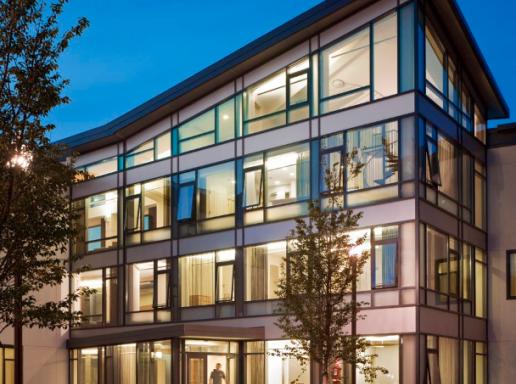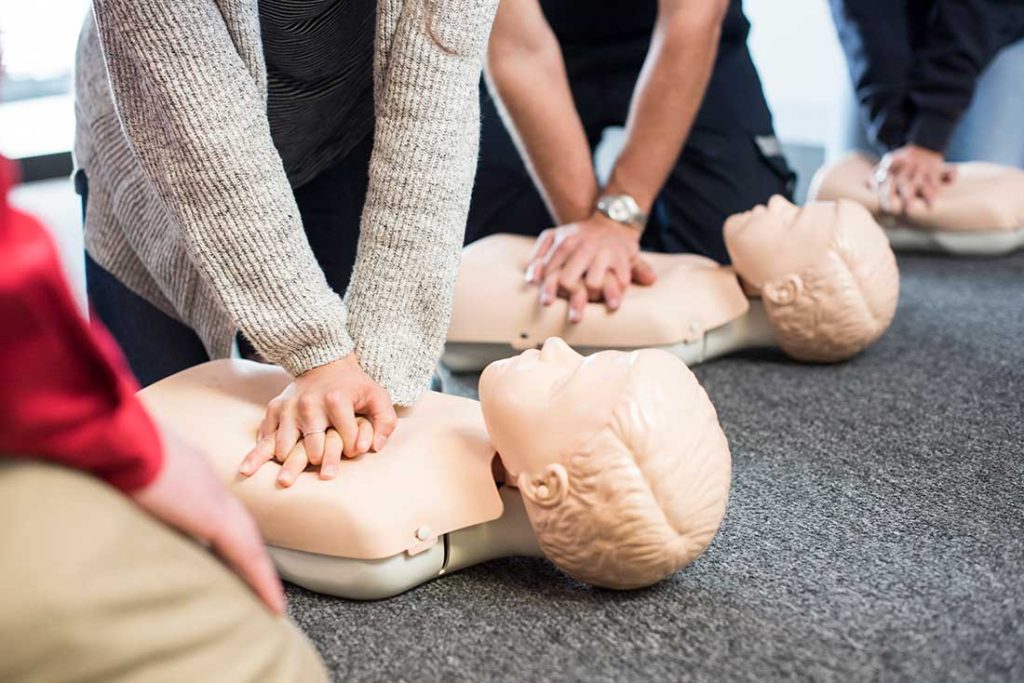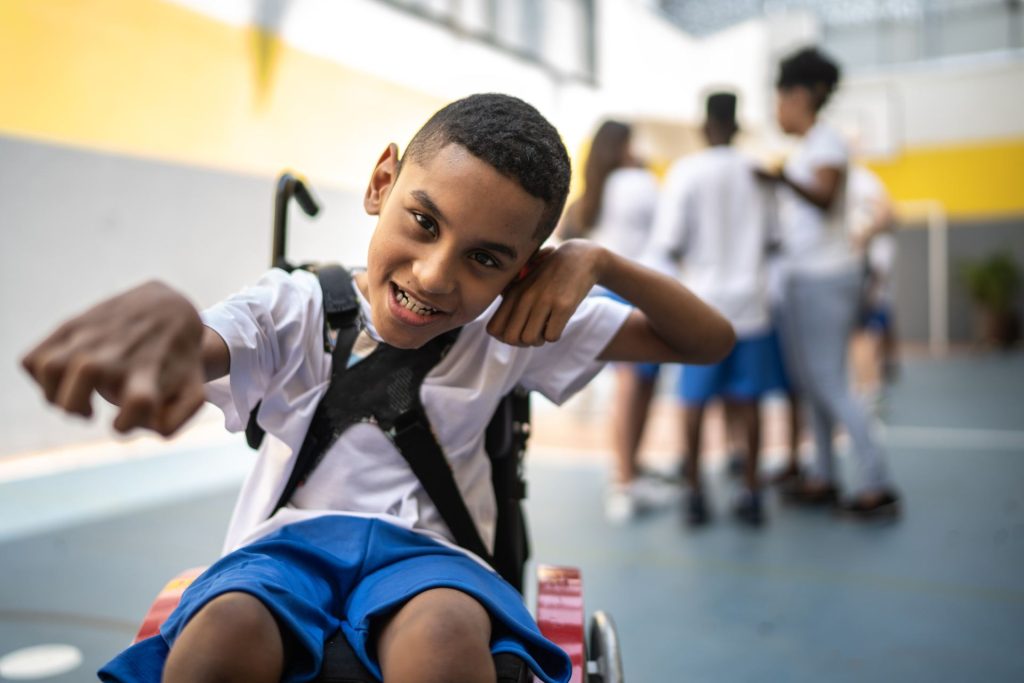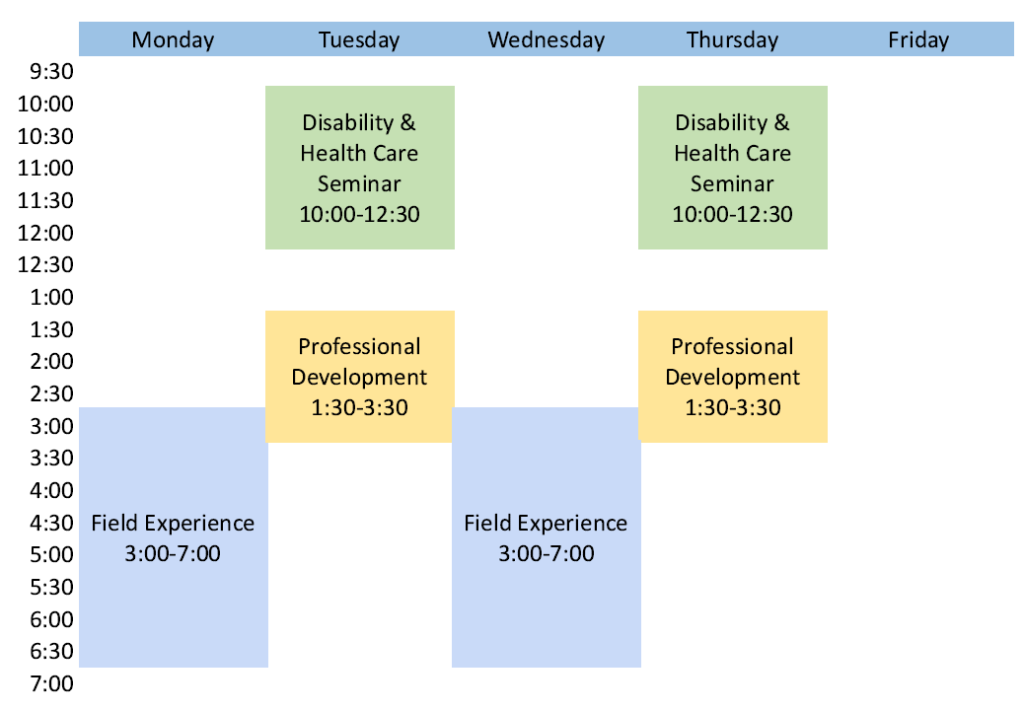Campus to Community at Mount Ida
This program brings the Campus to Community Respite Care Program to the Mount Ida campus of UMass Amherst.
Now recruiting pre-health students to participate in a 7-credit summer program in which you learn about providing health care to people with disabilities, receive hands on training and professional development, and provide 100 hours of respite care to a family raising a child with medical complexity. Students receive reduced tuition rates and a $500 scholarship.
Program director: Ashley Woodman, Ph.D.
Email: awoodman@umass.edu
Office hours: book an appointment
What is the purpose of this program?
The purpose of this program is to provide targeted coursework, training, and experience to better prepare the next generation of health care providers to provide high quality health care services to people with disabilities. People with disabilities were recently categorized as a population facing health disparities (NIH, 2023). Though many factors contribute to these health disparities, lack of disability-specific knowledge and experience among health care providers plays a significant role.
Who can participate?
Undergraduate students interested in careers in health care or disability services, broadly defined, are invited to apply. This program is intended for students from all majors except nursing. No prior disability-related experience or coursework is expected. In accordance with UMass guidelines, students should have a GPA of at least 2.0 and 30 college credits to participate in the internship component of the program. Students must be able to pass a criminal background check (CORI) to participate in the program.
The Campus to Community at Mount Ida Program is dedicated to the training, professional development, and success of all our students, and we are committed to upholding the campus values of diversity, equity and inclusion on the UMass campus and beyond. First-generation students and students from groups historically underrepresented in medicine are highly encouraged to apply.
Where will this program take place?

The courses, simulation training, and professional development will take place in person at the Mount Ida campus of UMass Amherst (Newton, MA). Housing is available at the standard fees, though residency at Mount Ida is not a requirement for participation in the program.
The field experience will take place in families’ homes within a 30-minute commute of the Mount Ida campus (or another Boston-area “home base”). Students will be reimbursed for mileage on their own vehicles or receive financial support for ZipCar, Uber, Lyft, or public transit.
What are the components of the program?
There are three key components to the program. Students are expected to participate in all components of the program, unless special circumstances apply.
Seminar: Disability and Health Care (PSYCH 391DC)
In this seminar, students will explore a variety of topics related to disability and health care. Students will learn to challenge the pathology model of disability widespread among medical providers and medical institutions. Students will learn how to integrate elements of the social model of disability, the neurodiversity paradigm, disability justice and other disability-affirming paradigms in their careers as health care providers. Students will learn about health care disparities experienced by disabled people and unpack its root causes.
Professional Development: Community Service Learning (PSYCH 191M)
Students will receive professional development on topics related to providing home-based health care, respite care, and working with people with disabilities more generally.
Students will receive three nationally recognized credentials, including certifications in CPR and First Aid from the American Red Cross, Mental Health Youth First Aid from the National Council for Mental Well-Being, and the Respite Care Provider Training from the ARCH National Respite Network and Resource Center.

Additional training topics include:
- Providing care in home settings
- Experiences of families raising children with disabilities
- Providing trauma-informed care
- Practicing cultural humility
- Effective communication strategies
- Responding to challenging behavior
- Planning developmentally appropriate and accessible activities
- Collaborating with families and keeping records
Students will also participate in hands-on training with simulation equipment. Students will receive guidance, supervision, and feedback from nurses and pediatricians specializing in providing care to children with medical complexity in home settings. Training will target the “enhanced care services” provided by complex care assistants in Massachusetts. This training is for professional development only, as students will not be authorized to perform these tasks in their roles as respite care providers.
- Enteral G-tube/J-tube feedings
- Skin care including application of OTC products or routine G-tube/J-tube care
- Oxygen therapy
- Oral (dental) suction to remove superficial oral secretions
- Ostomy and catheter care
- Modified meal preparation
- Equipment management and maintenance (wheelchair, CPAP/BiPAP, oxygen and Respiratory care equipment) and paperwork
- Braces, splints, and/or pressure stockings
- Transportation to medical providers / pharmacy
- Incidental services
Field experience: Respite Care for Families of Children with Medical Complexity (PSYCH 398DD)

The final, but critical, component of the program is applying course content and professional skills to 100 hours of practical experience providing respite care to a family raising a child with medical complexity. Starting in week 3 of the program, students will be matched to a family referred through the Boston Children’s Hospital Complex Care Service and similar programs serving families of children with medical complexity.
Matches will be based on both student and family preferences, interests/hobbies, allergies, and schedules as well as student skill and comfort levels. Some students may be matched with more than one family, depending on family and student interest and availability. Students are expected to complete 100 hours of field experience throughout the summer, with approximately 40 hours complete in summer session 1 (8 hours per week, weeks 3-7) and the remaining 60 hours complete in summer session 2 (average 10 hours per week).
In summer session 2, students and families will arrange their own schedules. Some families and students may prefer full-time weekly placements, weekend placements, or shorter placements on a weekly basis throughout the summer – or some combination thereof. These preferences will be taken into consideration during the initial matching process but are also subject to negotiation between the students and families. Communicating directly with families about scheduling is a critical aspect of professional development.
How many credits will I get and how much does it cost?
PSYCH 391DC
Disability and Health Care (3 credits)
- Standard UWW rate of $550 per credit in-state ($925 per credit out-of-state)
PSYCH 191M
Community Service Learning (2 credits)
- Reduced rate of $165 per credit (compared to $255)
PSYCH 398DD
Prac/Field Work in Developmental Disabilities and Human Services (2 credits)
- Reduced rate of $165 per credit (compared to $255)
The total cost for the program is $2,310 in-state ($3,435 out-of-state) for 7 credits. An $85 summer semester registration fee applies. Students who complete 100 hours of field experience are eligible to receive a $500 scholarship. Work-study students may receive hourly compensation through the work-study program instead (email the program director for more information).
What is the schedule for the program?
Summer session 1 – May 21, 2024 – July 3, 2024
Coursework and professional development are scheduled on Tuesdays and Thursdays between 10:00 and 3:30. This leaves Mondays and Wednesdays available for field placement. Field experience starts in the third week of the program (June 3rd).
- Seminar – Tuesdays/Thursdays 10:00-12:30
- Professional development – Tuesdays/Thursdays 1:30-3:30
- Field experience – Mondays/Wednesdays (4 hours per day, schedules vary)
Sample Schedule

Summer session 2 – July 8, 2024 – August 16, 2024
For the remainder of the summer, schedules will vary. Students will complete the remaining hours of field experience (approximately 60 hours). There will be no live courses or trainings complete in the second summer session. Students will be submitting weekly journals and timesheets through Canvas.
Who are the instructors?
Disability and Health Care (PSYCH 391DC) is taught by Lindsay Demers, Ph.D. Dr. Demers presently serves as the Director of the Department of Medicine Education Evaluation Core at Boston University.
The professional development course is taught by the program director, Ashley Woodman, Ph.D. Dr. Woodman is the Director of the Developmental Disabilities and Human Services program at UMass Amherst. Additional guest speakers from the Boston area will come to our course.
The field experience is coordinated by the program director, Ashley Woodman. Families are referred to the program through the Boston Children’s Complex Care Service and similar programs specializing in supporting the health care needs of children with medical complexity.
Questions?
Contact the program director by email or sign up for office hours. An information session will be scheduled for early April 2024.
